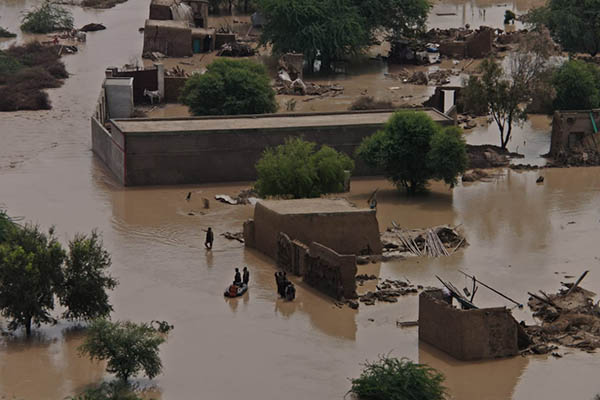
Screengrab of the devastation in Dera Ismail Khan due to this year’s rains
The Government of Pakistan on Thursday declared a national emergency over the ongoing rains that have left large parts of the country underwater, as the National Disaster Management Authority (NDMA) reported that 937 people, including 343 children, had been killed since mid-June and 1,343 injured.
In its latest report, the NDMA said Sindh remained the worst-hit, with 306 deaths and 876 injuries, while Balochistan had confirmed 234 deaths and 101 injured. In Khyber-Pakhtunkhwa, 185 people have died and 237 injured, while Punjab has reported 165 deaths and 105 injuries. Pakistan-administered Kashmir has lost 37 lives to the rains, with 20 people confirmed injured, and Gilgit-Baltistan has suffered 9 deaths and 4 injured. Islamabad has thus far reported 1 death due to various rain-related incidents.
Addressing a press conference, Climate Change Minister Sherry Rehman said Pakistan had received 241 percent more rain in August, 166.8mm, than its average of 48mm. According to the Met Office, Sindh has received 522 percent more rain than average, while Balochistan has witnessed 496 percent more than usual. Rehman said parts of Sindh had received 784 percent more rain than average.
Excessive rainfall has, similarly, been reported across the country. Per the Met Office, Gilgit-Baltistan, has received rains 99 percent over average, while Punjab has witnessed 90 percent more than usual. Khyber-Pakhtunkhwa has witnessed 31 percent above normal rain this monsoon season.
Noting the federal government had formed a “war room” at the NDMA to lead relief operations nationwide, Rehman stressed authorities were still in “rescue mode,” as rehabilitation efforts could not commence until rains halted. “Pakistan is now in its 8th cycle of monsoon [this year]; normally the country has only three to four cycles,” she said, warning forecasts suggested yet another monsoon cycle could commence next month.
Both Rehman and Prime Minister Shebaz Sharif said the devastation caused by this year’s floods was comparable to the tragedy of the 2010 floods, noting current statistics were likely far lower than actual values, as several areas of the country remained inaccessible. “The ongoing rain spell has caused devastation across the country,” the prime minister said in a posting on Twitter. “The losses, though yet to be documented, are comparable to flash floods of 2010. Grateful to the international community for their sympathies, condolences and pledges of support. Together we will build back better,” he vowed.
According to Rehman, there are roughly 30 million people without any shelter across Pakistan, with thousands requiring urgent delivery of food and medication. She said the Sindh government was seeking one million waterproof tents on an urgent basis, while Balochistan needed 100,000.
International donors
Following a meeting between lawmakers and international donor agencies, various global bodies decided to donate $500 million to Pakistan to help relief efforts for the “climate-induced humanitarian disaster.” According to a statement, World Bank Country Director for Pakistan Najy Benhassine said immediate assistance of $350 million would be disbursed by the end of this week, while the World Food Program has pledged $110 million in aid. The Asian Development Bank has likewise earmarked $20 million, while the U.K. has pledged £1.5 million and an additional £30 million for projects related to flood relief activities.
According to the government’s estimates, it requires at least Rs. 72.36 billion for immediate relief, including Rs. 7.33 billion for food items; Rs. 8.713 billion for non-food I tems; and Rs. 1.627 billion for healthcare. It has also listed Rs. 9.024 billion as compensation for livestock lost to the rains and Rs. 4.65 billion for machinery required for relief efforts. The initial estimates suggest Rs. 41 billion would be required to rebuild at least 82,000 homes damaged by the rains.
The government has repeatedly urged Pakistanis, both local and overseas, to donate generously for flood relief projects.
Quetta isolated
Balochistan capital Quetta was completely isolated on Friday, as hours of rains left the city inundated, with no electricity and a cessation of telecommunication services. According to local media, at least 500 people have been stranded, with a breach in the Sabri Dam leaving more than 100 village at risk. The province has remained virtually inaccessible for nearly a week, as all road networks are submerged, with authorities also warning of internet connectivity issues and suspension of gas supplies.
A major bridge also collapsed in the Bolan district, cutting off rail links. Authorities say the Pakistan Army, Frontier Corps and local administration are jointly working to rescue affected people and shift them to safer areas.
Khyber-Pakhtunkhwa is also reporting flash floods due to hill torrents, with several areas of Gilgit-Baltistan now inundated. In Bahrain, Swat, several buildings have collapsed and the ongoing landslides have left roads connecting the region to the rest of the country blocked.
